Ebola Outbreak in Congo: Deadly Disease, Even Deadlier System
| revcom.us
Editors’ Note: Below is a lightly edited excerpt of a letter from volunteer correspondents for revcom.us. We welcome and appreciate such correspondence that helps pull the lens back to the larger systemic links, nature and causes of events like the Ebola outbreak. And doing this, while pointing out the need for sharp struggle—where needed—with people, our people, against anti-scientific ideas and for their fundamental interests. This is precious when the mainstream media largely trumpets xenophobic American chauvinism.
An outbreak of the deadly Ebola virus has struck the Democratic Republic of Congo (DRC) and has recently spread across the border into the neighboring country of Uganda. More than 1,400 people have suffered painful, horrible deaths and the known number infected is over 2,000. Up to one-quarter of cases are unreported. The disease is spreading at an accelerating rate. The World Health Organization (WHO) said it may be two years before the outbreak is under control.
During the 2014-2016 Ebola outbreak in West Africa, more than 11,000 people died. After that outbreak, researchers, doctors, and others were determined that such a disaster would never be repeated. Emergency response teams were reorganized, strategies were rethought, new research on the virus was carried out, and a vaccine was developed. When this recent outbreak began there was optimism that it could be quickly contained.
“Despite this, the response has failed,” Karin Huster and Justin Healy, a nurse and physician working with the medical aid group Doctors Without Borders in the DRC, wrote in The BMJ (British Medical Journal). “In the volatile context of North Kivu—a region where armed groups, distrust of government, and socioeconomic injustices violently intersect—the Ebola response has been met with distrust and violent attacks on health workers and health facilities, the most recent being the killing of Dr. Richard Mouzoko,” they continue. Dr. Mouzoko was an epidemiologist from Cameroon working in the DRC who was murdered by armed gunmen on April 19.
Ebola is a deadly disease (see sidebar, “What is Ebola?”), but it is the chain of oppression from slave days to today in Congo and Africa as a whole that has created the conditions for Ebola to spread and make it difficult to eradicate.
A Wealth of Resources Together with Extreme Poverty
Congo is one of the most mineral-rich countries in Africa. The DRC supplies cobalt, for jet engines and batteries, and coltan, used in mobile phones and laptops.
Yet, because of the domination of Congo by capitalism-imperialism (see "How Imperialism Ravaged Congo"), Congo is among the poorest countries on the planet with an average per capita income of $1.30 per day. Total expenditure on health is $32 per person per year (in the United States it is $10,224.) Two-thirds of its population suffers from under-nutrition. In 2012, only about half of the population had access to safe drinking water. This extreme poverty contributes to the spread of Ebola, but in itself it is only a part of the cause.
Brutal Militias, Ebola, and Your Cell Phone
A war has been raging throughout the DRC for the last 25 years, fanned and manipulated by the imperialist powers. More than five million people, mainly civilians, have been killed, 300,000 women raped, and additional millions displaced. More than 100 militias currently operate in the DRC. Many of these are proxies for neighboring countries. Others represent religious groups including fundamentalist Christianity and Islam, ethnic and tribal divisions (such as Tutsi and Hutu), or local gangs and warlords. None of them are any good for the people, or represent anything fundamentally emancipatory. The central government is savagely brutal toward the people, but too weak to take control of the whole country.
These militias get a significant amount of their arms and resources through looting the mineral wealth of Congo. A United Nations Report called the sale of coltan and other minerals “the engine of the conflict in the DRC.”
These militias, in addition to attacking the people, have attacked medical workers and Ebola treatment centers. This has made it much harder to deal with the disease. Between January and early May, 85 health workers have been wounded and four killed.
More than 60,000 people in North Kivu province have left their homes since the latest wave of armed attacks began in late March. This is also a factor contributing to the spread of Ebola.
The government also plays a vicious role in relation to the outbreak. The New York Times reported that “Police officers and soldiers accompanying Ebola response teams have on occasion opened fire during confrontations with grieving family.” This is not only criminal, it has also exacerbated the situation. People do not trust the government-backed health system and what it is saying about the disease and the measures that must be taken to stop the epidemic. In December 2018, the government used the outbreak as a pretext to stop voting in the region. People have seen one regime after another pile up billions in secret bank accounts while the people exist in poverty, and this is enforced by the army and police and supported by the imperialist powers and the imperialist system.
There is a blood-soaked imperialist supply chain running from the militias in the DRC to iPhones and PlayStations of the U.S., European Union nations, and other rich countries. The profits Apple, Google and company make in high-tech come from enforced child labor (over half of the children in areas of coltan mining will end up working there), savage militias, extreme hunger, malnutrition, and disease in Congo. Now this chain is covered with the blood of more than 1,000 victims of the Ebola virus.
Unscientific Ideas Contribute to the Outbreak
The New York Times reports that the people in some communities where the virus is spreading have attacked health care workers when they have tried to take the bodies of the dead. In traditional burials in the DRC, mourners have a lot of contact with the body of the deceased. The bodies of Ebola victims are highly contagious. Handling the bodies of deceased family members is a major way that the disease is spread.
We do not fully understand everything that is involved in the thinking of the people who are in the middle of a hell on earth, nor do we know how widespread the attacks by the people on health workers are. There are good reasons for people to not trust the government or the United Nations. But in the midst of a dangerous outbreak wrong ideas among the people can allow a disease to spread in ways that are horrific—and reactionary forces can seize on unscientific thinking among the people to manipulate them, and also to make the outbreak worse. This was the case, for example, during the AIDS epidemic in the U.S. when anti-gay prejudice (and other unscientific ideas) helped the disease to spread and were fanned by reactionary politicians.
In the situation in Congo, unscientific thinking—and the lack of access to a basic understanding of science and the scientific method by the people—is a further huge burden on the people in a horrific situation. This point from BAsics, from the talks and writings of Bob Avakian, gets at something very important: “Oppressed people who are unable or unwilling to confront reality as it actually is, are condemned to remain enslaved and oppressed.” (BAsics 4:1)
In the face of a public health emergency, it is the duty of those taking responsibility for the interests of the people to struggle—sometimes sharply—against wrong ideas that are fueling the outbreak. If they care about the people, those fighting for the truth must persist even if it means putting their lives or safety on the line.
American Lives Are NOT More Important Than Other People’s Lives
During the first two weeks of June, several hundred migrants from Central Africa came to the U.S. border near San Antonio to escape the horrific conditions in their countries. Fascist anti-immigrant media outlets in the U.S., including Infowars, Breitbart, and Laura Ingraham of Fox News, have begun to spread lies that these migrants are carrying the Ebola virus. Because of the length of their journey and the health screenings they receive when crossing the border, there is no chance that any of the people carry the virus. This fascist fear-mongering is nothing but a justification to attack and round up immigrants and refugees, especially those from Africa. Anyone with a sense of justice and compassion should welcome refugees from Central Africa who have made an extremely difficult journey. Any attempts to round up or attack immigrants must be opposed and stopped. And, if any health care worker returning from Africa or migrant does present with the virus in the country, they should be given the treatment they need.
During the last Ebola outbreak, the United States did nothing while thousands were dying. Only when the disease threatened to spread to the U.S. was any attention paid to it. Even then the U.S. was not interested in helping the people of West Africa. Instead, it went on a xenophobic rampage targeting African people and health care workers who risked their lives to help people in Africa. Trump, before he became president, played a key role in fanning this ugly response.
The American way of life rests on a foundation of slavery, theft, genocide, exploitation, and war. To uphold that “way of life” is to uphold (and glory in) that history and present-day reality. For a powerful repudiation of that kind of thinking we urge readers to check out Bob Avakian’s “Answer to People Who Complain About Immigrants Crossing the Border,” from a Q&A following his speech Why We Need An Actual Revolution And How We Can Really Make Revolution.
The lives of people of Congo—and Africa as a whole—are a horror because of the role of the U.S. and what it represents and enforces in the world. Now a new outbreak of Ebola is added to that suffering.
The world does not need to be like this. A better world is possible. We need revolution, nothing less!
Click here to watch the whole film:
Why We Need An Actual Revolution And How We Can Really Make Revolution
What is Ebola?
The Ebola virus was first identified in 1976. The virus gets its name from a river in the Democratic Republic of Congo.
Ebola is extremely deadly, killing between 30 and 90 percent of those infected. It is classified as Biohazard Level 4, the highest classification, and can only be studied in specially equipped labs by scientists wearing special suits.
Ebola is spread by contact with the bodily fluids of infected persons, usually blood, vomit, or feces. In addition to humans it is carried by bats and some species of monkeys and apes. It is believed that fruit bats are the “natural reservoir” of the disease, meaning that they are the breeding grounds for the virus, carrying it without becoming sick.
Recent studies have linked Ebola outbreaks with deforestation of African rain forests. The areas hit the hardest in the 2014 outbreak, for example, were sites of extensive deforestation, linked to capitalist production for the world market and the poverty of the people who are driven by starvation to cut down forests to survive. The Guinea rain forest has shrunk to less than one-fifth of its original size to make way for cocoa production for chocolate. In Liberia, more than half of the forests have been sold off to logging companies.
The Ebola virus itself may be evolving to better adapt to transmission and spread among humans. Scientists studied genetic material from more than 1,500 samples of the virus and identified mutations that allow the virus to bind better with human cells.
Before the 2014-2016 outbreak, scientists had developed several vaccines for Ebola. But none of these vaccines were even tested. Why? Because pharmaceutical companies could not figure out how to generate a profit, from vaccines and drugs whose main consumers would be from some of the poorest countries in the world! It was only after Ebola threatened to spread to Europe and the U.S. than any funds were put into testing a vaccine. At the time, a specialist from the UK wrote in an op-ed in the Guardian, “This is the moral bankruptcy of capitalism.”
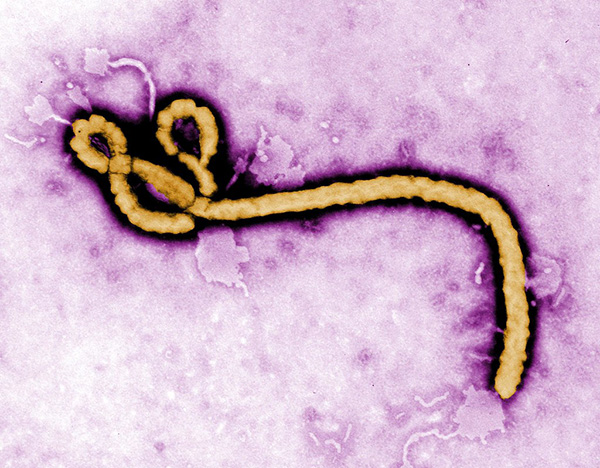 Colorized electron microscope photo of Ebola virus. Viruses like Ebola are made up of strands of DNA or RNA, long chains of genetic material that pass along the code for living things to make copies of themselves. The strands are surrounded by a protein shell. [Photo: Frederick A. Murphy/CDC]
Colorized electron microscope photo of Ebola virus. Viruses like Ebola are made up of strands of DNA or RNA, long chains of genetic material that pass along the code for living things to make copies of themselves. The strands are surrounded by a protein shell. [Photo: Frederick A. Murphy/CDC]
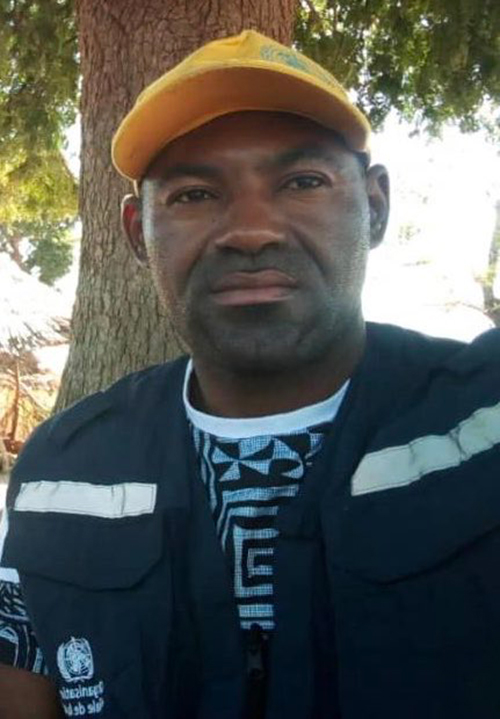
Dr. Richard Valery Mouzoko Kiboung, an epidemiologist from Cameroon went to the city of Butembo, one of the epicenters of the Ebola outbreak at the end of March to battle the outbreak. He was assigned to lead the local response team. On April 19, armed gunmen broke into a staff meeting he was leading, killing him and wounding two others.
In an interview with Nature, Tedros Adhanom Ghebreyesus, the head of the World Health Organization, told of meeting with health workers in Congo shortly after Mouzoko’s assassination: “I could see how shocked they were. But, at the same time, many said, ‘We are life-savers—we will not be intimidated by this attack. We will strengthen our resolve, and we will fight to finish Ebola.’ They could have said, ‘Take us away, we don’t want to risk our lives.’ They didn’t say that. They said, ‘We will fight.’” (Photo: WHO Cameroon)
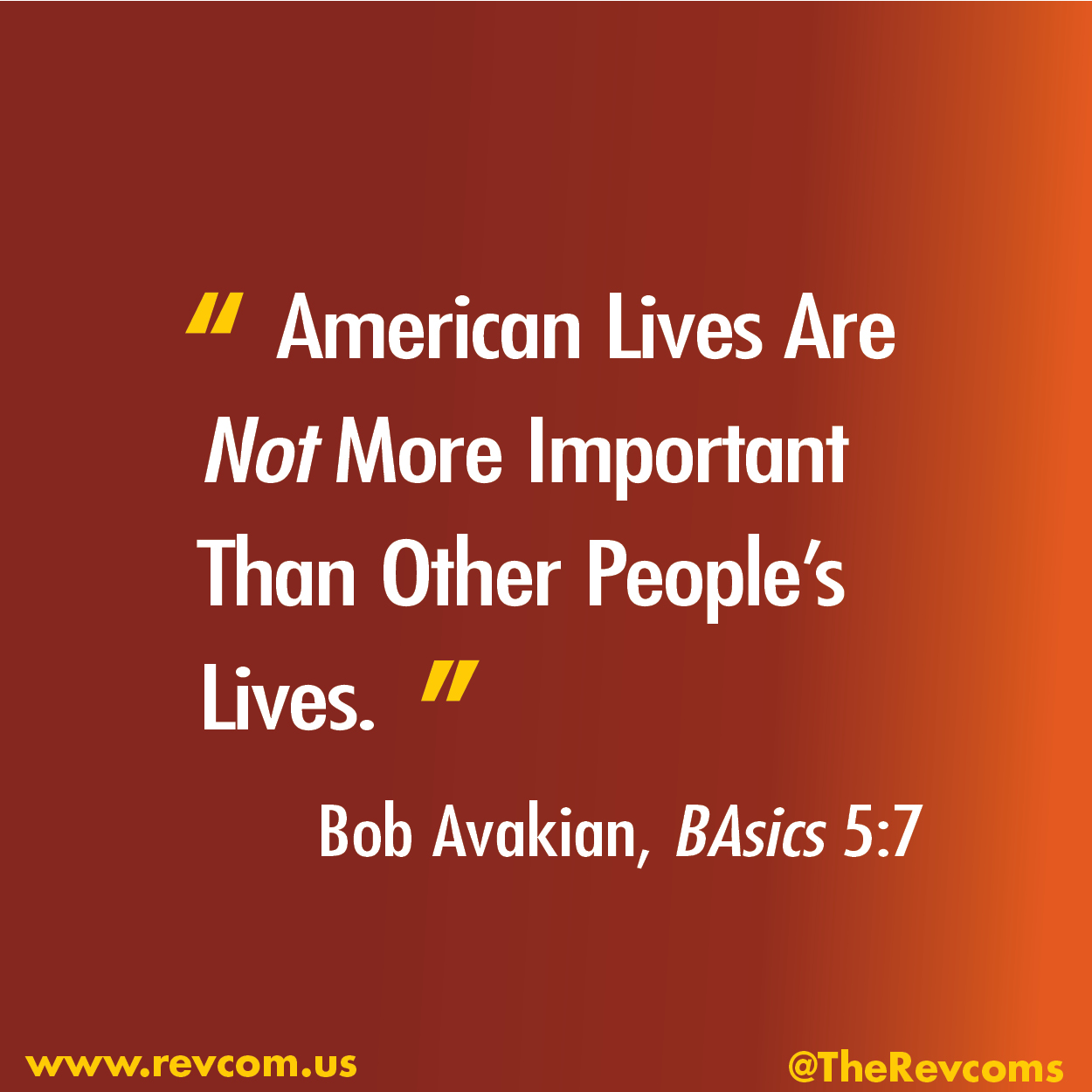
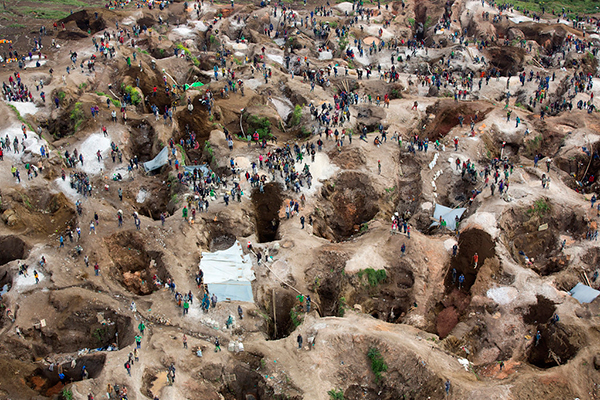 A coltan mine in North Kivu, DRC. Coltan is a mineral that is crucial to making cellphones and other portable electronic devices. The DRC is one of the few places in the world where it can be found. Mining of coltan in Congo is done by hand and miners make about $1 per day. 30% of the children in the area work in the mines. The income from coltan funds the armed militia groups that terrorize the people, government officials and corporations. The main beneficiary from this suffering is the capitalist-imperialist system whose profits depend on a steady access to these minerals. (Photo: United Nations MONUSCO/Sylvain Liechti)
A coltan mine in North Kivu, DRC. Coltan is a mineral that is crucial to making cellphones and other portable electronic devices. The DRC is one of the few places in the world where it can be found. Mining of coltan in Congo is done by hand and miners make about $1 per day. 30% of the children in the area work in the mines. The income from coltan funds the armed militia groups that terrorize the people, government officials and corporations. The main beneficiary from this suffering is the capitalist-imperialist system whose profits depend on a steady access to these minerals. (Photo: United Nations MONUSCO/Sylvain Liechti)
See Also:
How Imperialism Ravaged Congo
During the slave trade, more than 10 million people were ripped from their homes and families in Africa. Forty percent of the people kidnapped from Africa came from Congo and nearby Angola, robbing the region of its most valuable resource and destroying African societies.
At the 1884-1885 Berlin Conference—where European powers divided up Africa—King Leopold II of Belgium was given personal control of much of central Africa. A system of slavery was created to increase rubber production. Expeditions were sent out to destroy villages which refused to participate. The economic and cultural life of the people was devastated further.
Failure to meet the quotas set by Leopold was punishable by death. Rather than use ammunition, that had to be imported, hands were chopped off of the people of Congo to prove that they had been killed...
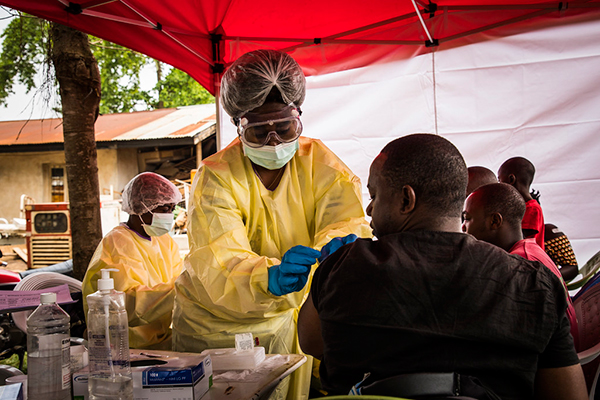 A health worker vaccinates a man who has been in contact with an Ebola affected person. January 2019 in Kivu Region, DRC. (Photo: World Bank/Vincent Tremeau)
A health worker vaccinates a man who has been in contact with an Ebola affected person. January 2019 in Kivu Region, DRC. (Photo: World Bank/Vincent Tremeau)
Get a free email subscription to revcom.us:

